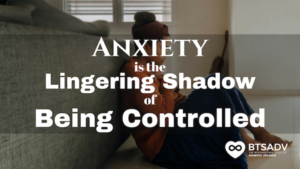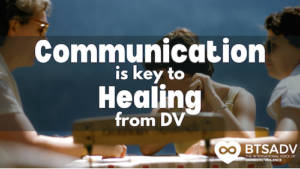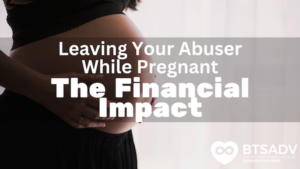By Iris Pendelton For many, anxiety is often pictured as...
Read MoreThe Ghost of Relationship Trauma: The Lingering Effects of Being in an Abusive Relationship
Website Director
Relationship trauma. It lingers in the shadows. It comes out when you least expect it. It is the heavy leftover weight of the abusive relationship that some people carry around after the dust clears and the connection is over. Sometimes relationship trauma is triggered by a tone of voice, a look, or a string of words. At other times it is brought on by a current event or situation that reminds you of something that happened in the past. No matter what causes it to occur, the symptoms are the same. I find myself gripped with sudden panic and fear when it happens to me. My muscles become tense, sometimes I begin shaking, and my breathing becomes shallow. I sometimes zone out and enter a dazed daydream-like state when this happens. When I experience these signs, I know I’m encountering the ghost of relationship trauma.
Sometimes people may feel that when they leave the abuse, they leave everything behind that was a part of the abuse. It would make it much easier to move on if that were the case. Unfortunately, people in abusive relationships may leave the relationship with emotional scars, wounds, and lingering effects that they carry into their new relationships. Relationship trauma is one of those lingering effects.
The trauma of the abusive relationship can create some long-lasting triggers and scars that can make it scary to be in new relationships. Relationship trauma can even cause healthy relationships to feel unsafe. The survivor of domestic violence may be suspicious, fearful, or experience worry in the new relationship because of the past abuse they faced.
The Effects of Relationship Trauma Can Be Seen in Healthy Relationships
Even after leaving the abusive relationship, I find myself affected by the numerous triggers left behind. These triggers have influenced how I behave in my current relationship at times.
In the early months of dating my now husband, it was evident that I was experiencing relationship trauma. Even though our relationship has always been safe and healthy, I found myself waiting for the other shoe to drop. Although he has only shown me kindness, I was waiting for the façade to disappear as it had in the abusive relationship. I stood guard, expecting him to one day verbally lash out at me like my abusive ex used to do. I proceeded slowly and cautiously in my relationship with him. He remained calm, patient, and kind despite my fear and extreme caution.
The daily emotional and verbal abuse in the abusive relationship trained me to behave a certain way to avoid upsetting the abuser. For example, I learned to accept what the abuser said as the final word for fear of retaliation or punishment. So, in my current relationship, I sometimes become anxious when I need to talk to my husband about an issue or challenge. It takes me a lot of time before I speak with him about some things, even though I know I am safe to do so. Hiding my thoughts and feelings is an example of one of the protective behaviors I used to keep me safe during my past abusive relationship. This behavior made me feel safe within the confines of the abusive relationship, but within a healthy relationship, it sometimes leads to undue stress, worry, and suspicion.
It caught me by surprise when I realized that the peacefulness of my healthy relationship with my husband caused fear to rise in me. In the abusive relationship, I had grown accustomed to the ups and downs of the abusive relationship dynamic I experienced. As a result, the peacefulness of my healthy relationship with my husband felt strange at first. The abusive relationship of the past had me accustomed to experiencing periods of peace followed by seasons of strife. In the abusive relationship, I learned that when things were peaceful, a storm was on the way. Since I was used to the bumpy, inconsistent abuse cycle of a relationship, in a safe, consistent relationship, it was sometimes like I was sitting on the edge of my seat, waiting for something to go wrong.
Although my husband has only shown me consistency and kindness, the lingering relationship trauma continues to impact my interactions with him. Sometimes I’m not even aware when the relationship trauma influences how I respond in my current relationship. One day he was headed to the store to buy some things, and he said he could tell by the look on my face that I wanted to go with him, but I didn’t ask him if I could go. Finally, my husband asked me if I wanted to go with him, and I said yes. At that moment, I realized I was still responding to the programming from my previous relationship that trained me not to ask where the abuser was going or when he was returning. In the past, I had gotten into an argument with the abuser about him leaving in the afternoon and staying out all night, which resulted in a very violent episode. Over time, that experience and numerous others taught me not to ask where he was going or to ask to go with him. I shared this experience with my husband that day and in his loving way he reassured me that it is ok for me to ask him to go with him if I want to. My husband reminded me he is not an abuser and will not hurt me. He reassured me that I was safe. He has a great way of calming my worries and fears around this trauma.
Managing the Effects of Relationship Trauma
It is essential to stay grounded in the current reality because when relationship trauma visits, sometimes it can mentally take you back to the place where you experienced abuse. When it visits, the feelings experienced can make you feel like you are experiencing abuse at the current moment. Even when you are safe and in no danger, memories from the past can convince you otherwise.
I am learning to fight against relationship trauma when it visits me. I remind myself to think and be in the present moment. When the effects of relationship trauma show up, I remember to base my feelings and reactions on my current time and relationship.
I do a mental reality check, focusing on the truth of my current relationship with my husband. So, I don’t ignore the fear and worry associated with the past abuse, but I remind myself that the current relationship is not causing those feelings. They are remnants of the past.
I judge my current relationship by the events happening in the present instead of thinking about what happened in the past relationship. I remind myself of what my current partner is doing rather than reacting and treating him as if he is doing what the abuser did in the past.
Some of the questions I ask myself during this reality check include:
- How does he make me feel?
- How does he treat me?
- Has he ever hurt me?
- Has he ever disrespected me?
The answer to all these questions is no, reassuring me that he is the safe, kind man I know he is.
I go deeper to inquire:
- Does he welcome conversations where I address my worries, fears, and concerns?
- Does he listen to my concerns?
- Is he patient with me?
The answer to these questions is a resounding yes, reminding me of my reality in the current moment.
I wish it were as easy as getting out of an abusive relationship and living happily ever after, but this isn’t the case. What we lived through was traumatic. It is understandable that there will be some lingering effects. These effects do not have to stop your ability to have healthy, happy relationships. As discussed in this article, there are strategies to overcome the lingering effects of relationship trauma. I wish you happy, healthy, thriving relationships in the future.
Communication is Key to Helping You Heal from DV
By Mikayla Shave While communication is widely observed to be...
Read MoreWhat Is Run4Her and Why Should You Sign Up?
By Hanna Embry Break the silence against domestic violence does...
Read MoreLeaving an Abuser while Pregnant and the Financial Impacts
By Hanna Embry The financial impact, and overall impact of...
Read More









